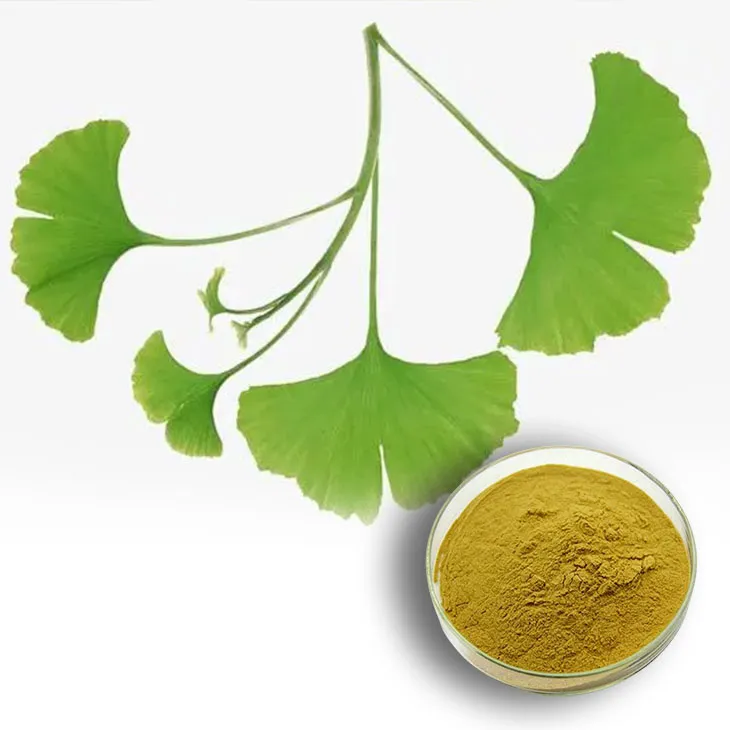- 0086-571-85302990
- sales@greenskybio.com
How do ginkgo biloba extract manufacturers formulate strategies to launch new products to the market?
2024-12-11

1. Introduction
The market for health supplements has been growing steadily, and Ginkgo biloba extract is one of the popular products in this category. For manufacturers, launching a new Ginkgo biloba extract product successfully requires careful strategic planning. This article will explore the various strategies that manufacturers can adopt to introduce their new products to the market.

2. Product Differentiation
2.1 Unique Formulations
Combining with Other Ingredients: One of the most effective ways to achieve product differentiation is by creating unique formulations. Manufacturers can consider combining Ginkgo biloba with other complementary ingredients. For example, combining it with vitamins like Vitamin C or E, which are known for their antioxidant properties. This combination can target consumers who are looking for a more comprehensive antioxidant supplement. Another option could be to combine Ginkgo biloba with herbal ingredients such as ginseng. Ginseng is often associated with increased energy and mental focus, and when combined with Ginkgo biloba, it can appeal to consumers who need a boost in both cognitive function and overall vitality.
2.2 Specialized Dosage Forms
Manufacturers can also focus on specialized dosage forms. Instead of the traditional tablet or capsule, they can develop products in forms like liquid extracts or chewable tablets. Liquid extracts may be more easily absorbed by the body for some consumers, especially those with digestion problems. Chewable tablets, on the other hand, can be more appealing to children or those who have difficulty swallowing pills. This can open up new consumer segments for the Ginkgo biloba extract product.
2.3 Targeted Product Features
Developing products with targeted features can also set a new Ginkgo biloba extract product apart from the competition. For instance, some manufacturers may develop a "fast - acting" Ginkgo biloba extract. This can be appealing to consumers who are looking for immediate results, such as those who need a quick cognitive boost during a busy workday. Another feature could be a "long - lasting" formula, which may be suitable for older consumers who want to maintain their cognitive health over an extended period.

3. Pricing Strategy
3.1 Cost - Based Pricing
Calculating Production Costs: A fundamental aspect of pricing strategy is understanding the production costs. Manufacturers need to consider all the costs involved in sourcing Ginkgo biloba, processing it into an extract, formulating the product, packaging, and marketing. For example, if the cost of raw Ginkgo biloba has increased due to supply shortages, this will impact the overall production cost. By accurately calculating these costs, manufacturers can ensure that the price they set will cover all expenses and still leave room for profit.
3.2 Market - Based Pricing
Researching Competitor Prices: Manufacturers should also research the prices of competing Ginkgo biloba extract products in the market. If their product offers unique features or higher quality, they may be able to price it slightly higher. However, if the market is highly competitive and there are many similar products, they may need to price more competitively. For example, if a new brand enters a market where established brands are selling Ginkgo biloba extract tablets at a relatively low price, the new manufacturer may need to find a balance between offering a lower price to attract customers and still making a profit.
3.3 Value - Based Pricing
Determining Perceived Value: Understanding the perceived value of the product by consumers is crucial for pricing. If consumers believe that a Ginkgo biloba extract product offers significant health benefits, they may be willing to pay a higher price. Manufacturers can conduct market research to determine how consumers value different aspects of the product, such as its purity, effectiveness, and brand reputation. Based on this, they can set a price that reflects the perceived value. For example, if a product is marketed as a high - quality, pure Ginkgo biloba extract with scientific research backing its effectiveness, consumers may be more likely to pay a premium price.

4. Customer Education
4.1 Brochures and Pamphlets
Providing In - Depth Information: Brochures and pamphlets can be an effective way to educate customers about Ginkgo biloba extract. These materials can provide in - depth information about the source of Ginkgo biloba, how the extract is made, and its potential health benefits. For example, a brochure can explain how Ginkgo biloba has been used in traditional medicine for centuries and the modern scientific research that supports its use for cognitive health. It can also include details about the proper dosage and any potential side effects, helping consumers make more informed decisions.
4.2 Online Articles and Blogs
Reaching a Wider Audience: In the digital age, online articles and blogs are powerful tools for customer education. Manufacturers can create informative articles about Ginkgo biloba extract on their own websites or collaborate with health bloggers. These articles can cover topics such as the latest research findings on Ginkgo biloba, how it compares to other cognitive - enhancing supplements, and tips for choosing a high - quality product. By sharing this information online, manufacturers can reach a wider audience, including those who are actively researching health supplements.
4.3 In - Store Demonstrations
Interactive Education: In - store demonstrations can provide an interactive way to educate customers. Retailers can set up a demonstration area where trained staff can explain the features and benefits of Ginkgo biloba extract products. They can show consumers how to take the product, answer questions about its effectiveness, and provide samples for customers to try. This hands - on experience can increase consumers' confidence in the product and encourage them to make a purchase.

5. Marketing and Promotion
5.1 Social Media Marketing
Building Brand Awareness: Social media platforms offer manufacturers a great opportunity to build brand awareness for their new Ginkgo biloba extract products. They can create engaging posts about the product's benefits, share user testimonials, and run promotional campaigns. For example, on Instagram, manufacturers can post high - quality pictures of their Ginkgo biloba extract products along with short captions highlighting its key features. They can also use Facebook to target specific demographics, such as older adults who are more likely to be interested in cognitive health supplements.
5.2 Influencer Marketing
Leveraging Influencer Endorsement: Collaborating with influencers in the health and wellness space can be a highly effective marketing strategy. Influencers can promote the Ginkgo biloba extract product to their followers through sponsored posts or product reviews. For instance, a well - known fitness influencer can recommend the product to their followers as a way to enhance mental focus during workouts. This can introduce the product to a new audience who trust the influencer's recommendations.
5.3 Trade Shows and Exhibitions
Showcasing the Product: Participating in trade shows and exhibitions related to health supplements is an excellent way to showcase the new Ginkgo biloba extract product. Manufacturers can set up an attractive booth, display their product range, and provide product samples and brochures. This allows them to directly interact with potential customers, industry experts, and distributors. At these events, they can also stay updated on the latest industry trends and competitor products.
6. Regulatory Compliance
6.1 Understanding Regulatory Requirements
Researching Local and International Regulations: Manufacturers must first understand the regulatory requirements for Ginkgo biloba extract products. Different countries and regions may have different regulations regarding the production, labeling, and marketing of such products. For example, in the United States, the Food and Drug Administration (FDA) has specific guidelines for dietary supplements. Manufacturers need to ensure that their product meets all the necessary criteria, such as proper ingredient labeling, safety standards, and manufacturing practices.
6.2 Obtaining Necessary Certifications
Meeting Quality and Safety Standards: Obtaining necessary certifications is crucial for building consumer trust. Certifications such as Good Manufacturing Practice (GMP) can assure consumers that the product is manufactured in a clean, safe, and quality - controlled environment. Some manufacturers may also seek organic certifications if their Ginkgo biloba is sourced organically. These certifications can be prominently displayed on the product packaging to attract consumers who are concerned about quality and safety.
7. Conclusion
Launching a new Ginkgo biloba extract product to the market requires a comprehensive strategy that encompasses product differentiation, pricing, customer education, marketing, and regulatory compliance. By carefully considering each of these aspects, manufacturers can increase the chances of their new product being successfully launched and accepted in the market. Each strategy plays a vital role in creating a product that stands out, is priced competitively, is well - understood by consumers, and meets all regulatory requirements.
FAQ:
What are the key factors in formulating a new product launch strategy for Ginkgo biloba extract?
There are several key factors. Product differentiation is crucial, such as creating unique formulations by combining Ginkgo biloba with other ingredients. Pricing strategy also matters, which needs to be both competitive and profitable considering production costs and market expectations. Moreover, customer education is necessary to increase product awareness as many consumers may not be fully aware of the product's benefits.
How can Ginkgo biloba extract manufacturers achieve product differentiation?
Manufacturers can achieve product differentiation by developing unique formulations. For example, they can combine Ginkgo biloba with other complementary ingredients. This way, they can target specific consumer segments more effectively.
What should be considered in the pricing strategy for new Ginkgo biloba extract products?
In the pricing strategy, manufacturers need to consider production costs and market expectations. The price should be set in a way that is competitive enough to attract customers while also being profitable for the business.
Why is customer education important for launching new Ginkgo biloba extract products?
Customer education is important because many consumers may not be fully aware of the potential benefits of Ginkgo biloba extract. By providing educational content through various channels like brochures, online articles, and in - store demonstrations, manufacturers can increase product awareness and drive sales.
How can manufacturers increase the market acceptance of new Ginkgo biloba extract products?
Manufacturers can increase market acceptance by focusing on product differentiation, having a proper pricing strategy, and conducting customer education. Product differentiation can attract different consumer segments, a reasonable price can make the product more competitive, and customer education can raise awareness about the product's benefits.
Related literature
- The Health Benefits of Ginkgo biloba Extract: A Review"
- "Ginkgo biloba Extract in the Nutraceutical Market: Trends and Opportunities"
- "Formulation Strategies for Botanical Extracts: The Case of Ginkgo biloba"
- ▶ Hesperidin
- ▶ Citrus Bioflavonoids
- ▶ Plant Extract
- ▶ lycopene
- ▶ Diosmin
- ▶ Grape seed extract
- ▶ Sea buckthorn Juice Powder
- ▶ Fruit Juice Powder
- ▶ Hops Extract
- ▶ Artichoke Extract
- ▶ Mushroom extract
- ▶ Astaxanthin
- ▶ Green Tea Extract
- ▶ Curcumin
- ▶ Horse Chestnut Extract
- ▶ Other Product
- ▶ Boswellia Serrata Extract
- ▶ Resveratrol
- ▶ Marigold Extract
- ▶ Grape Leaf Extract
- ▶ New Product
- ▶ Aminolevulinic acid
- ▶ Cranberry Extract
- ▶ Red Yeast Rice
- ▶ Red Wine Extract
-
Saponin Extract
2024-12-11
-
Sugarcane Extract
2024-12-11
-
Acai Berry Extract
2024-12-11
-
Nutmeg Extract
2024-12-11
-
Natural grape seed extract
2024-12-11
-
Motherwort Extract
2024-12-11
-
Hesperidin
2024-12-11
-
Grape Leaf Extract
2024-12-11
-
Europen Bilberry Extract
2024-12-11
-
Soy Extract
2024-12-11





















